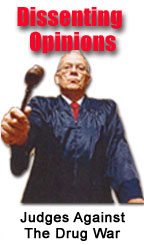 June
4, 2005 - The Norwich Bulletin (CT) June
4, 2005 - The Norwich Bulletin (CT)
'War On Drugs' Not Meant To Be Won
By Chris Powell, managing editor of the Journal Inquirer
in Manchester.
With remarks to a civic group in Enfield recently, Superior
Court Judge Howard Scheinblum engaged in what is seldom forgiven
in Connecticut's public life: candor.
The judge asserted what can neither be denied nor acknowledged
-- that public policy on drugs doesn't work.
Speaking from his 15 years of experience on the bench, Scheinblum
estimated 90 percent of criminal cases in Connecticut are connected
in some way to the pursuit of illegal drugs, and he asserted
that society would be far better off to let users of such drugs
obtain them by prescription and to be charged for them according
to their ability to pay.
That is, the judge said, drugs are not the problem, not the
cause of thievery, robbery, and violence; drug prohibition is.
If now-illegal drugs were available to addicts by prescription,
many addicts would waste their lives away, but at least they
wouldn't be robbing and killing others for money for drugs, and
drug dealers would not be killing others over drug sales territory.
Most violent crime would disappear.
Sensible as this might seem -- after all, despite drug criminalization,
illegal drugs are more prevalent than ever; the legal drugs,
alcohol and tobacco, claim so many more lives than illegal drugs;
and who really cares how people waste their lives as long as
they don't hurt others? -- the judge said any departure from
futile drug policy would be blocked by "vested interests."
For if drug prohibition crime ended, the judge said, Connecticut
wouldn't need as many police, courts, prisons, drug programs
and so forth.
Judge Scheinblum's analysis only seems cynical, but it has
been borne out by the political action of Connecticut's prison
guards union against the transfer of inmates to prisons out of
state where costs of imprisonment are lower.
The families of prisoners have protested as well, but the
union didn't care about prisoner welfare; it cared about losing
business.
The judge's analysis also has been borne out by state government's
refusal to audit drug-criminalization policy. The policy's failure
is obvious, but politicians are paralyzed by fear of the policy's
financial beneficiaries and the fear of asking the public to
challenge old but faulty assumptions.
As with many other policies in Connecticut that are never
evaluated for results, the "war on drugs" is not meant
to be won; it is meant to be waged.
Even its racially disproportionate casualties are not enough
to prompt politicians to engage in candor like Judge Scheinblum's.
Indeed, Connecticut's politicians are happy to put half the state's
young men of color in prison if the other half can be hired to
guard them.
Back to Dissenting Opinions
of Judges
If you have a dissenting opinion of a Federal or State Judge,
please mail or e-mail a copy to:
November Coalition
282 West Astor
Colville, WA 99114
(509) 684-1550
editor@november.org
|



